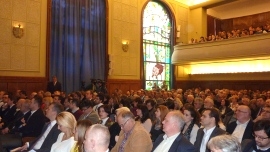The Serbia Research, Innovation and Technology Transfer Project was launched on February 2, 2015 at the Serbian Academy of Sciences and Arts in Belgrade.
This joint project of the Ministry of Education, Science and Technological Development, the European Union and the World Bank is financed with €2.5 million Euros from EU's pre-accession funds through July 2018. The project builds on the successes of the ongoing EU-funded Serbia Innovation Project, which helped establish the Serbia Innovation Fund. With an EU grant of 8.4 million Euros, the Innovation Fund has successfully supported 53 innovative start-ups between 2011-2014.
The new Serbia Research, Innovation and Technology Transfer Project will help the Ministry and the Innovation Fund to further boost research and development (R&D), and innovation in Serbia and to pilot a system of technology transfer in order to foster a knowledge-based economy.
State Secretary Mr. Aleksandar Belic addressed the audience on behalf of Mr. Srđan Verbić, Minister of Education, Science and Technological Development, as well as H.E. Michael Davenport, Head of the EU Delegation to Serbia and Tony Verheijen, World Bank Country Manager for Serbia.







